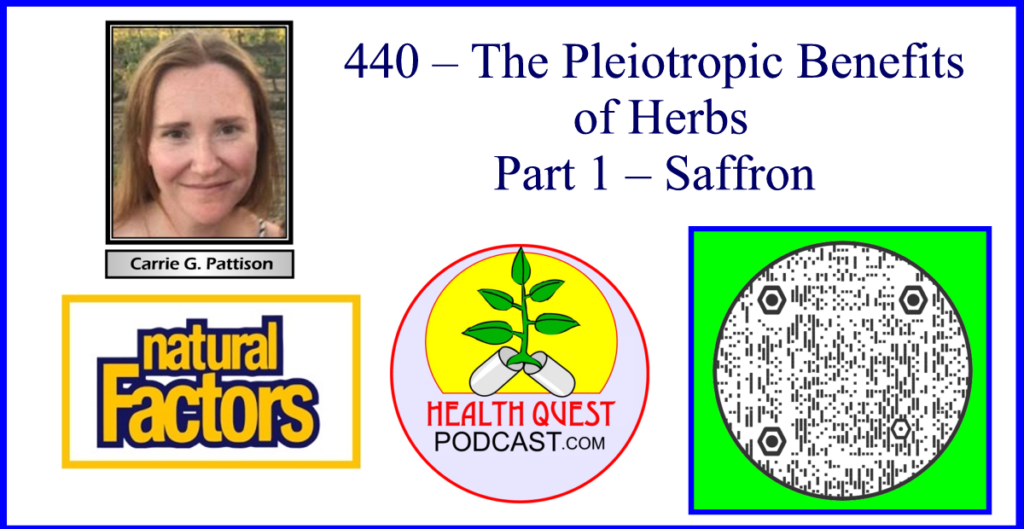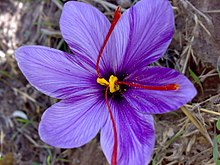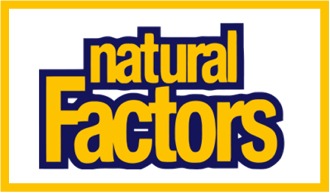Podcast: Play in new window | Download (Duration: 59:33 — 109.1MB)
Carrie Pattison Discusses Saffron: A Golden Spice with Multiple Benefits

In this episode, Carrie Pattison discusses the fascinating concept of pleiotropic effects in herbal medicine. Pleiotropy refers to the ability of a particular herb or plant compound to have multiple benefits on the body. One herb that exemplifies this concept is saffron, also known as the “golden spice.” In this blog post, we will explore the historical uses, sourcing, and potential health benefits of saffron, shedding light on its pleiotropic effects.
Historical Uses and Cultural Significance: Saffron has a rich history dating back thousands of years. Ancient civilizations, including the Romans and Greeks, recognized its medicinal properties. Hippocrates, the father of medicine, wrote about saffron’s use in gynecological conditions, while other physicians like Dioscorides and Galen praised its aphrodisiac qualities and ability to soothe skin irritations. The use of saffron in traditional medicine spans various cultures, including Ayurveda and Traditional Chinese Medicine.

Sourcing and Quality: Saffron is derived from the stigmas of the crocus flower, and its cultivation requires meticulous hand harvesting. Due to its labor-intensive nature, saffron is often referred to as “worth its weight in gold.” To ensure the highest quality, it is crucial to source saffron from reputable suppliers who prioritize fair trade practices and sustainable harvesting methods. Natural Factors, a leading company in the natural products industry, offers Affron, a trademarked and clinically studied saffron extract sourced from Spain’s Castilla-La Mancha region.
Pleiotropic Effects and Potential Health Benefits: While saffron is commonly associated with culinary uses, its potential health benefits extend far beyond the kitchen. Research suggests that saffron may have pleiotropic effects on various aspects of health, including:
- Mood and Mental Health: Saffron has been studied for its potential to support emotional well-being and alleviate symptoms of depression and anxiety. Its ability to promote a state of carefree gaiety has been noted throughout history.
- Eye Health: Studies have explored saffron’s potential in supporting ophthalmologic pathologies and improving overall eye health.
- Neurological Conditions: Preliminary research indicates that saffron may have neuroprotective properties and could be beneficial in neurodegenerative diseases.
- Cardiovascular Health: Some studies suggest that saffron may help maintain healthy cardiovascular function by supporting blood flow and reducing oxidative stress.
- Metabolic Health: Saffron has shown promise in supporting healthy metabolic function, including blood sugar regulation and weight management.
Conclusion: Saffron, the golden spice, exemplifies the concept of pleiotropic effects in herbal medicine. Its historical uses and cultural significance, combined with emerging research, highlight its potential to support various aspects of health. When choosing saffron supplements, it is essential to prioritize quality and select reputable brands like Natural Factors’ Saffron, which ensures traceability, sustainable sourcing, and optimal extraction methods. By embracing the pleiotropic effects of saffron, we can harness the power of this ancient spice to enhance our overall well-being.
Disclaimer: This blog post is for informational purposes only and should not be considered medical advice. Please consult with a healthcare professional before incorporating saffron or any other supplements into your routine.*
Carrie G. Pattison
Listen to all interviews with Carrie Pattison

Carrie G. Pattison, MSOM, LAc, is a practicing herbalist, licensed acupuncturist, and trained home-birth midwife. A graduate of the National University of Natural Medicine, Carrie serves as National Educator for Natural Factors and adjunct professor of Herbal Studies at Huntington University of Health Sciences.
Originally from rural Alaska, Carrie’s love for travel and social-justice issues in the developing world led her to undergraduate degrees focused on global development and relief and fuels her lifelong passion for health and healing.
Natural Factors
Listen to all Natural Factors interviews.
Today, Natural Factors is one of the largest manufacturers of nutritional products in North America. But our origins reach back to the 1950s, and right from day one, we’ve always been fully committed to making products right. We are not a public company with shareholders to impress. Instead, we care about impressing you.
One of the things that set Natural Factors apart from others in our industry is the breadth of knowledge represented by the scientific experts that work for us. Drawn from around the world and chosen for their unique training and background, our scientists and quality control specialists are recognized experts in their fields.
Factors Farms are certified organic, we don’t pollute the earth with pesticides and chemical fertilizers. Our crops are fertilized only with compost and nitrogen-rich sea plants. We grow true “species” non-hybridized, non-GMO seeds, including many open-pollinated varieties. Growing locally also helps reduce carbon emissions from overseas transportation, and keep jobs in the community.












{ 0 comments… add one now }